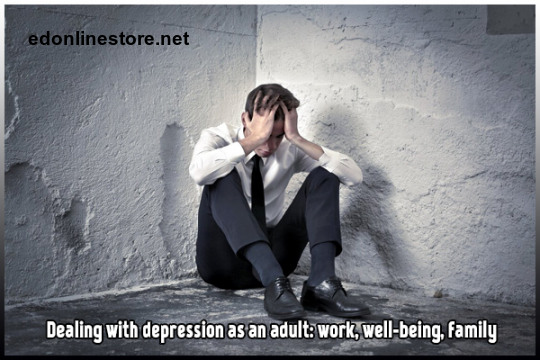Depression, or Major Depressive Disorder as diagnosed in the Diagnostic and Statistical Manual of Mental Disorders Fifth Edition is a common diagnosis among many people. Sufferers of depression often look for various methods to relieve the feelings of depression and to be able to function normally in life. People often feel depressed or sad at several different stages of life but many people ask what separates the feelings of sadness versus clinical depression. Depression affects a large number of people in America alone. According to the National Institute of Mental Health, approximately 17.3 million adults had at least one depressive episode in 2017. The average age of someone who suffers from depression is 18 to 25 years of age and women experience depression more often than men do. Depression is one of the most common mental health ailments that physicians diagnose.
Depression is characterized by several outstanding indicators which include a depressed feeling most of the day, every day, a decreased interest in activities that once brought pleasure, lack of sleep, feelings of worthlessness, and a loss of ability to concentrate. These indicators must be present for at least two weeks to be diagnosed with depression. There are many causes of depression including a chemical imbalance in the brain, external factors, including the death of someone close, or any other major events that the person experiences. There are also studies showing that depression can be a genetic condition which means it is passed down from generation to generation and if someone in your family has a history of depression you have a 40% chance of experiencing depression as well.

One of the most common forms of treatment for depression is medication. There are several different forms of medication that can be used to decrease the symptoms of depression including: Selective Serotonin Reuptake Inhibitors (SSRI), Serotonin and Norepinephrine Reuptake Inhibitors (SNRI), Monoamine Oxidase Inhibitor (MAOI), and tricyclic antidepressants. Many people refer to these medications as antidepressants. Some common name brand of antidepressants include: Prozac, Paxil, Celexa, Kamagra oral jelly in der Schweiz and Cymbalta. Medication for depression works by introducing more serotonin in the brain and the medication also helps the brain accept the extra serotonin. However, as with any other medication there are side effects such as weight gain, nausea, vomiting, and thoughts of suicide. Another form of treatment for depression is counseling with a licensed clinical social worker or a psychologist. There are several different forms of counseling that are effective for treating depression including cognitive behavioral therapy, dialectic behavioral therapy, crisis intervention and psychotherapy. Each form of therapy provides the person with an understanding and empowerment to be able to decrease the negative symptoms of depression. With the use of medication and therapy, the person suffering from depression has a better chance of developing coping skills that they can use in the future.
There are other sources of treatment for people who suffer from depression that include Electroconvulsive Therapy (ECT). Electroconvulsive Therapy was first developed in 1938 and has been used for people who suffer from depression when other forms of modalities do not work. Electroconvulsive Therapy produces an electric current that travels across the brain inducing seizure activity to decrease symptoms of depression. However ECT is only effective about 50% of the time and can cause long lasting negative side effects. ECT is only used when every other modality failed to produce relief of the depression. Depression, as with any other medical condition comes with complications. Some complications of depression are loss of employment, the breakdown of a family and suicide. Death by suicide is common with people who suffer from depression. Therefore, when someone is experiencing depression, it is important to assess their risk for suicide or any other self-injurious behaviors.
There are many other diagnoses that co-occur with depression including: bipolar disorder, anxiety, obsessive compulsive disorders, personality disorders, mood disorders and post-traumatic stress disorder. Each additional diagnosis has the capability to increase the negative effects of depression. One very common co-occuring diagnosis is generalized anxiety disorder. This is characterized by anxiety that cannot be explained by any other factor. The person experiences many physical ailments including increased heart rate, the feeling of doom, sweating, shaking, and a stomach ache that are not related to any other medical issue. Treatment for anxiety is similar to treatment for depression, including the use of medication and counseling.
In conclusion, depression is a common mental health diagnosis that can cause issues in many different parts of an individual’s life. Fortunately, depression is a treatable condition and there are many different modalities that can be used to treat it.

I am General practitioner (GP) in Melbourne since 2006.


I have been dealing with depression since I was in grade school. I didnt know it. I would have panic attacks and just pass them off as normal. Now that i have been dealing with it untreated for many many years. It has gotten much worse. I deal with anxiety, an eating disorder, self injury, and suicidal thoughts. I wish i had addressed it sooner. Now everything is a struggle. But I still hide my flaws, my friends and family still think I’m the happy peppy girl that can make anyone laugh. But I feel like I’m always a lie.
Living with depression, I like to recall the good times. I had an ideal childhood. It was sunny and my mom was always there to take us to the beach or the neighborhood pool. She woke us up, and she put us to bed. Fast forward 20 years; I had my own baby. With all the love and joy that little boy brought to me…came the post-partum depression. When you hear about depression from friends and see it in the movies you think it’s like being in the dark. That’s not what depression looked like for me. It was white. Blinding white. Everything surrounding me was so bright, I literally keep my head under the pillow. I felt an emptiness that I could not for the life of me rationalize. I couldn’t keep up with being the mother my mom was. I struggle and strive to be like her. And to top it off there was the sense that nothing was right when Trump got elected the year I was pregnant. Everything hasn’t been the same but it’s gotten better. I’ve gotten better. I’m a not-so terrible stay-at-home parent with depression and we’re doing okay.
Every day is a struggle. Force myself out of bed. Force myself into the shower. Force myself to eat, work, smile, pretend nothing’s wrong. Home was difficult enough when I was growing up that even a “normal” kid would have had a hard time, but for someone like me, it meant that every bad thing was magnified by a hundred. I finally got diagnosed once I was out on my own, and meds have helped a lot, but don’t let anyone tell you it goes away. It’s a disease, like diabetes or heart disease, and you have to treat it every day, or it’ll get you.
So I’ve been dealing with depression for about 3 years. After my grandmother passed away, it hit me. She raised me and not having her around has just led me into a spiral of sadness and melancholy I cannot get over. I have no significant other so I’m on my own and it really sucks. Just thinking about it makes me cry and never want to leave my house. I don’t know what I’m going to do with myself but I’ve been doing ‘nothing’ but have the most deep depressing thoughts for 3 years, so I guess I’ll have to continue with that, it just sucks.
Depression is a symptom of my bipolar disorder. I’ve gone to therapy for it but we just changed insurances and now I’m without a therapist. I feel useless some days because I have nothing to do. I hope seeing a therapist again will help motivate me to change my life
It’s like everyday you have to live with a cloud over your head and it’s consistently raining occasionally there’s thunder which means that life is going to get a little bit worse during the time, and you have to try and think about the rainbows that will probably never come. Living with depression is not easy. You essentially have to fight yourself every chance you have, and sometimes you have to wonder if you’re good enough for certain things. Sometimes you’re aggravated with yourself, sometimes it’s other people, sometimes you have no desire to get up out of bed, and sometimes you don’t even want to live. Depression lingers as if it were an anchor that was last onto your leg and drags on the ground every day. As much as it’s a part of you, you have to focus on the positive before you decide to focus on the negative.
I became depressed when I was diagnosed with Chronic Pelvic Pain Syndrome, a disease that impacts men. Living with pain, every single day, and trying to maintain your happiness, and your lifestyle, became a weight at times that was tough to bear. I crawled in a dark hole, lived under a rock for several months, trying to figure out how to live with this affliction. Doing better, figuring out how to live with this, but my life will never be the same.
At the age of 3, my father walked out of my life. Then at 7, the only other manly figure, my uncle, passed away. 3 years later my aunt passed. My mother was so lost in her own grief she wasn’t there to raise me. Some days it’s hard to do anything, Getting out of bed is an achievement. Living with depression is hard, but pushing threw it is the only option to get out of it.
I was more than happy to seek out this net-site.I needed to thanks for your time for this excellent read!! I undoubtedly enjoying every little little bit of it and I have you bookmarked to check out new stuff you weblog post.
It¦s actually a nice and useful piece of information. I¦m happy that you just shared this helpful info with us. Please stay us informed like this. Thanks for sharing.
Keep working ,fantastic job!